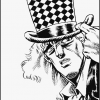Howdy, Stranger!
It looks like you're new here. If you want to get involved, click one of these buttons!
If you use an @yahoo.com email or any related Yahoo services, they have blocked us also due to "user complaints"
-UE
"A global closet thing" Close reading R. Kelly's Trapped In The Closet
How does one analyze a yet uncompleted work like Trapped In The Closet(Henceforth referred to as TITC in this text)? How is one to approach such an artistic, philosophical and intellectual triumph? In this series of essays I will attempt to do justice to this tour de force known to us poor mortals as TITC. I will proceed assuming that the reader has a cursory knowledge with the piece, and will link each video to provide context, and thus will skip summary to analyze various important lines and plot points.
Then she comes out and kisses me and to my surprise she ain't you/and now I've got this dumb look on my face like what have I done/How could I be so stupid to have laid here til the morning sun: In this passage, R.Kelly initially lures the audience into sympathy with the narrator by appearing to have show confusion and disbelief at his own adultery but quickly subverts our expectations by revealing that the narrator is only worried about getting caught. This establishes the character of the narrator and sets the tone for the self-involved moral universe of TITC.
Tellin' you now this girl's so good that she deserves an Oscar: The narrator's surprise at the woman's ability to hide her own emotions and lie to her husband recall Homer's surprise at Odysseus ability to hide his own emotions when returning home disguised in The Odyssey. The mention of an Oscar contrasts the parallel by reminding the reader that in our age, the ability to recede behind a mask and hide emotions is prized. Those interested can find further discussion of the Odysseus story in relation to modern culture in Hubert Dreyfus's All Things Shining a work which is, however, sadly unimformed by R. Kelly's perspective on modern subjectivity. This essay will, hopefully, address this modern poet's contribution to the theory of the subject.
You're not gonna believe it but things get deeper as the story goes on: R. Kelly here draws attention to the fact that this narrative, is in fact, a narrative, and thrusts the reader outside of immersion in the text in Brechtian manner, forcing the reader to look at the events in a different way.
Notes:
*The mindless repetition of "the closet" at the end, forces the reader into an obsessive mindset in sympathy with the narrator's own obsessive fear of discovery
*Despite hearing the cell phone from the closet, the husband first searches in other areas, suggesting that he does not want to discover the truth.
*The use of words like "dumb" "stupid" and "crazy" underline the irrationality of human drives, thus making the Humean point that reason is the slave of the passions.
*The sudden, violent, appearance of the beretta shocks us and forces us to once again feel distaste for the narrator.



Comments
God I missed you.
Some things never change...
YOU!
FUCK YEAH!
I got better music right here:
Mmm, comin' at'cha, lady,
Tellin' you what'cha wanna heh,
Spendin' your eh,
Mm, tellin' you that you gotta buy me a beer!